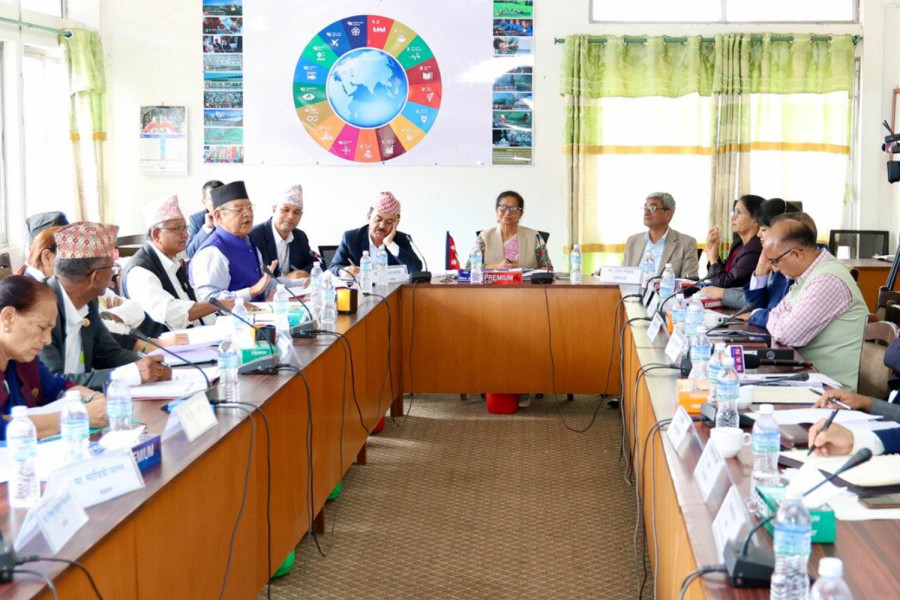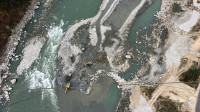National
Government pushes for tough ethics code for officials, I/NGOs
Seeks to check their activities. Affidavits for constitutional posts to ensure accountability.
Anil Giri
Nepal has resumed discussions on the draft of the National Integrity Policy, which was first tabled in 2018 during KP Sharma Oli’s second term as prime minister.
The draft policy, which received both praise and criticism from national and international stakeholders, is now back in the spotlight.
On Thursday, the Development, Economic Affairs and Good Governance Committee of the National Assembly resumed discussions on the draft of the policy. Sher Bahadur Deuba, soon after becoming prime minister on June 8, 2017, had pushed for this policy’s formulation.
A secretary at the Prime Minister’s Office said the policy had been gathering dust for five years, but now they were considering moving it forward.
The proposed policy requires those appointed to constitutional posts to sign an affidavit stating that they do not belong to any political party. It also states that the judiciary and constitutional bodies should not allow anyone to get perks or benefits not permitted by the law. Also, it proposes that teachers should not be members of any political party, and if they are, they must quit party membership.
Similarly, those holding positions in constitutional bodies cannot go abroad without informing the government, and they should notify the Ministry of Foreign Affairs if they need to travel for private reasons. The proposed policy also bars constitutional bodies, security agencies, and the judiciary from receiving direct assistance from national and international non-governmental organisations (NGOs).
The policy has separate provisions and regulations for NGOs and INGOs working inside Nepal. The NGO community had opposed some of the policy’s provisions. The document under consideration has a 13-point policy for NGOs and 25-point policy for INGOs.
Speaking at the meeting of the upper house committee, members said that the integrity policy should be effectively implemented across all organs and levels of government.
Urmila Aryal, an upper house member, said the government should be responsible for maintaining integrity in all sectors. “We need the right leadership, policy, and approach,” she said.
Another member, Jhakku Prasad Subedi, also asked the government to bring the integrity policy and implement it effectively.
“In order to make political and bureaucratic leadership disciplined, accountable and vigilant, we need a certain code of conduct,” he said. “Moral commitment is important as it stands above the law and the constitution.”
Another member of the upper house, Bamdev Gautam, said that the state should impose the integrity policy through legislation.
“Simply bringing out a policy is not enough. The government should formulate a law in order to enforce it.”
Other members, like Tul Prasad Bishawkarma and Ghanshyam Rijal, stated that Nepali society is very weak in terms of adhering to codes and ethics, “so it is the primary job of the political parties to first ensure that their leaders are clean.”
Some members said that certain lawmakers with criminal records have become ministers, which goes against the basic principles of the constitution, political norms, and ethics.
The proposed policy prohibits NGOs and INGOs from engaging in activities that incite hatred against Nepal.
Any NGO that is aware that an INGO or foreigner is trying to sow communal discord should inform the government authorities. Also, INGOs working inside Nepal cannot send reports to foreign countries without the consent of the Nepal government.
For INGOs, the draft policy states that their annual programmes and budget to be approved by the Finance Ministry should not influence the drafting of Nepal’s laws and policies. INGOs are also barred from implementing projects independently, and from sending their reports to their home countries without seeking permission from the government of Nepal.
Similarly, while operating inside Nepal, each INGO should fix the number of foreign officials, refrain from imposing foreign religious, social and other agenda, and ensure that foreign staffers do not remain in the same position for more than three years.
Likewise, INGOs failing to renew their registration within three months would be scrapped, as would those engaged in proselytisation, according to the draft policy.
In the case of NGOs, the proposed policy stated that they should be classified on the basis of sources of funds, and requires them to obtain permission from the Ministry of Finance to receive donations. Also, NGOs should inform the Ministry of Finance and the local administration within seven days of receiving donations.
Likewise, their administrative costs must not exceed a specified percentage of the total budget. NGOs failing to renew their registration for three months would be scrapped; more than two persons of a family cannot hold executive positions of an organisation, and a person should not remain in the same executive position for more than two terms. Likewise, public office holders have been barred from being involved in NGOs and INGOs.
Two former secretaries, Mohan Banjade and Sharada Prasad Trital, drafted the 23-page paper, suggesting policies for political parties, NGOs, INGOs, the diplomatic community, constitutional bodies, professors and teachers, the private sector and cooperatives.
Several national and international stakeholders, including the Human Rights Watch, the Nepali NGO fraternity, and Asian Human Rights Commission had expressed reservations over the draft, forcing the Oli government to halt its implementation in 2018.




 12.39°C Kathmandu
12.39°C Kathmandu














